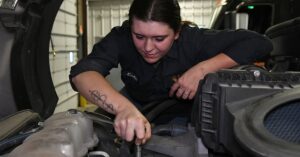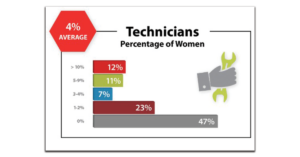Mike Schwarz, co-owner of Colorado-based repair shop JE-CO Truck and Trailer, says his company has nearly doubled its revenue in the four years since he purchased it, all while adding just a few additional technicians.
How did it do so? “By making more efficient technicians that mess up less and have more time to bill hours and do good work,” Schwarz revealed during a Shop Owner Roundtable webinar sponsored by Fullbay.

The key to JE-CO’s success has been partnering with a local school and helping mold prospective technicians before they even enter the workforce.
“We sponsor the school. The students wear our uniforms. We send our technicians in to do training, and of course we run an internship program. We get to pick the cream of the crop every year — we bring them in and pay them real money over the summer as high school students,” Schwarz said. “Our goal is to hire a handful of them full-time when they graduate.”
The company also hired Ian Matje, who was an instructor at the school, to build the internship program, but did so reluctantly.
“Ian wanted to leave the school. We didn’t want him to because we thought it would jeopardize our relationship with that school,” Schwarz recalled. But the fit was too good to pass up and Matje joined JE-CO. He began his role with the repair shop by assessing the skills of existing technicians and performing a skills gap analysis. He was also charged with leading the internship program and liaising with the school.
Summer jobs
Students working summer jobs in the shop earn nearly US$20 an hour, and when they graduate school earn about $27 an hour with a $4,000 tool allowance. The homemade techs are proving vital to the company’s growth, but lessons have been learned along the way.
Schwarz said it’s important to have a camp counselor-type figure in the shop to help acclimatize and teach them. “This shouldn’t be your best technician,” he said. “They often don’t know how to teach.”
It should be someone willing to work with them, invest time in them, and engage them as a teacher would, with the ultimate goal of making them feel a part of the family. Apprentices are paired with a senior mechanic but produce billable hours. JE-CO has a 20,000 sq.-ft. shop with about 25 technicians. It likes to add about six summer interns across its two shifts. The initial hires through the internship program, launched about two years ago, have stayed with the company.
Part of the secret to getting them to stay was to develop a clearly laid out career path. Reviews are done twice a year and technician raise sheets are published so techs know what to expect. Raises are between $1 and $3 an hour twice a year, depending on the certifications and training the technician has completed.
Career paths
It’s a tactic Schwarz borrowed from the business community he himself came from, where those at a consulting firm would have the opportunity to work their way to partner by enhancing skills and qualifications each year.
“Not everybody can get there,” he admitted. “Some don’t have the will, the fortitude or aptitude required to make it up that ladder.”
There’s no secrecy at JE-CO about how much money technicians make, Schwarz noted. Knowing how much a successful technician on the same shop floor is earning is a good motivator, he contended.
“I think it’s fair game for people to understand what the potential is and where they could be,” he said.
However, it’s not just the hourly rate that keeps the technicians working there. The top two billers receive weekly and quarterly bonuses. The top biller of the year receives a vacation for two.
“We do monthly lunches and dinners,” Schwarz added. “And I make a point of taking each technician to lunch or dinner, my goal is once every six months. The point is to get to know them and make them feel like they’re part of something.”
Other perks include annual boot bonuses and tool allowances, as well as a full benefits, paid vacation, and 401k [retirement plan] matching programs. The technicians enter regional and state level competitions, and recently took seven of the top eight spots in one of them. Developing local talent also ensures they’re more likely to stay, as they have family roots in the community and understand what the cost of living there is like.

A competitive environment is formed with a screen in the change room displaying weekly performance metrics. Some perks haven’t worked out, Schwarz admitted. Offering flat rate pay resulted in some techs trying to cherry-pick the easier jobs that would otherwise go to the students. Flexible work schedules also can lend themselves to some manipulation. The company offers time-and-a-half pay for Saturdays, as long as the technician isn’t giving up weekday shifts to work them.
Expectations are high, and floor cleanliness and comebacks are tracked vigilantly, with technicians incented for good performance in those areas. The internship program has worked out well for not only the business, but also the interns themselves. While there are limits to how many JE-CO can hire, “anyone who comes out and wants to continue in the field has never been unable to get a job,” Matje said.
The company has also gotten creative in how it recruits service advisors. While they are motivated and retained through commissions, they also receive their own perks like group nights at Top Golf and awards for billable hours and margins.
The goal with service advisors, Schwarz said, is to find the right personalities and train them on the truck side of the business. The hospitality and retail industries has been a fruitful source of new service advisor hires.
“If you can train them to learn the truck side, there are other industries you can pull from,” he said. “I really like finding people from the restaurant industry. We’re always interested in that really great salesperson who sold you that TV and did a great job. We are willing to put them through truck training and sales training and teach them our process.”











